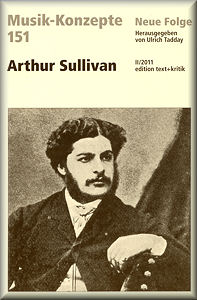Musik-Konzepte 151. Arthur Sullivan, ed. Ulrich Tadday. München:
edition text+kritik 2011. 114 pp., illustrations, music exx.
(IN GERMAN.)
 It
is a rare thing for any German author ever to deal with Arthur
Sullivan, probably one of the very first ones ever having been
Meinhard Saremba, Founder-Chairman of the Deutsche Arthur-Sullivan-Gesellschaft
(yes, there is such a registered charity in Germany) and one-time
German Representative of the British Music Society.
It
is a rare thing for any German author ever to deal with Arthur
Sullivan, probably one of the very first ones ever having been
Meinhard Saremba, Founder-Chairman of the Deutsche Arthur-Sullivan-Gesellschaft
(yes, there is such a registered charity in Germany) and one-time
German Representative of the British Music Society.
In fact, this is the first-ever collection of German language
essays on the Victorian composer and one of the very few that
exist anywhere. It was published in a German series of publications
begun in 1977. The first volume on a British composer was on
Frederick Delius and that came out in 2010.
This small book contains five articles in total, so there is
little space to deal with all the important aspects of Sullivan.
What is more it is sad that only one German author has actually
contributed to the book, the others being either English or
American. It would have been great if there could have emerged
some kind of German or European view on Sullivan, his foundation
in the schooling at the Leipzig Conservatoire and/or a positioning
of his light operas amid the European operetta milieu (the Viennese
operettas of Strauss, Suppé, Millöcker and Zeller and the French
operettas of Offenbach, Planquette, Messager and Delibes). Regrettably
these aspects are missing from the volume.
The first contribution in the book, by Benedict Taylor, attempts
to situate Sullivan in his context and assess his aesthetics.
Unfortunately many important aspects, such as the place of Sullivan
in 19th century British and European music, have been largely
omitted so that an informed assessment cannot take place. Taylor
tries to explain judgments made by some authors through some
of the compositions and extensive reference to original sources.
In doing so however he fails to take into the reckoning the
complete span of Sullivan’s music; there’s no mention of the
sacred music for example or of the Symphony in E. David J. Eden
treads more accustomed ground with a paper on Sullivan and his
librettists, dealing solely with a selection of the operatic
works and concentrating, not surprisingly, on the Gilbert connection.
The special musical features that Sullivan brings to these libretti
are not covered. This is in the face of Sullivan’s technique
of musical irony and parody remaining unsurpassed in the field
of 19th century light opera worldwide. It’s a field still largely
unploughed internationally. James Brooks Kuykendall deals with
Sullivan the “music dramatist” (deriving from the German “Musikdrama”),
concentrating especially on The Golden Legend, Ivanhoe,
and The Yeomen of the Guard. Here we have Sullivan the
music dramatist at his very best. It is I think the first time
Germans have been alerted to these works. Meinhard Saremba calls
his contribution simply “The Sullivan Problem”, again relating
to the reception of Sullivan’s music – supplying a finely judged
and knowledgeable paper. Finally Richard Silverman features
some of Sullivan’s stylistic features with special reference
to the matter of interpretation in performance.
This short book opens up avenues of possible future Sullivan
research, but in total far too few to make it a really important
publication. For the German understanding of British music -
and Sullivan, for that matter - it is of course highly important.
The next volume in the series on an English composer will be
on Edward Elgar.
Jürgen Schaarwächter
This short book opens up avenues of possible future Sullivan
research, but in total far too few to make it a really important
publication.




 All Nimbus reviews
All Nimbus reviews








